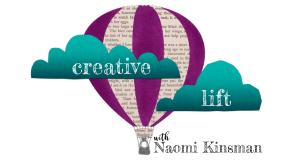Psst! If you haven’t yet subscribed to the Writerly Play Kit, you’re missing out! Issued monthly, the WP Kit is a collection of activities, book recommendations, and other inspiration to help you develop creative thinking by focusing on a single skill.
Why one specific skill?
As is true for building physical muscles, you can develop creative thinking mastery much more efficiently when you’re intentional. When you focus on one skill, you:
- progress more quickly with less friction
- build momentum and the confidence that comes with success
- make that skill a habit so that you can turn your focus elsewhere without losing ground
Wait … Creativity is a skill?
Yep, actually creative thinking is a collection of skills. A commonly held misbelief is that people are either creative or not. If I had a penny for every time someone has told me they’re “just not a creative person,” I’m pretty sure I could buy a private jet. One reason this myth is so prevalent, in my opinion, is that people focus on one aspect of creativity when they measure their capacity. So, they might think of creativity as the ability to generate a giant collection of ideas, or to craft a well-told story, or think quickly on the spot.
This narrow thinking often creates one of two problems.
First, a person might not be good at that thing. Maybe they struggle to come up with even three ideas, or they always figure out what they should have said hours after the moment has passed. Thus, they conclude that they aren’t a creative person without noticing other skills they DO have that are also key to creative thinking.
Second, a person may have a strength in one of these areas. When they’re asked to be creative, they play only this one note. When the process moves on to another stage, they may not have the next skill needed, and they get stuck. They may undervalue the importance of developing their creativity because they don’t realize that they are actually bumping repeatedly into a weakness in their overall skill set.
The way to develop creative thinking is through marginal gains.
In his book, Atomic Habits, James Clear shares the concept of marginal gains. Basically, when you improve through marginal gains, you make tiny changes, changes that might seem insignificant on their own. However, taken together, the collection of changes lead to overwhelming transformation. Becoming better at asking questions may not feel significant at first, but taken together with an improved ability to identify problems and generate ideas about possible solutions, soon you start to see fresh, exciting creativity coming to life in your world.
What are your strengths when it comes to creativity? How about areas that get in your way? What if you had clear, step-by-step strategies and a bookshelf of tools to overcome those challenges?
That’s exactly what the Writerly Play Kit is here to do for you.
So what are you waiting for?


